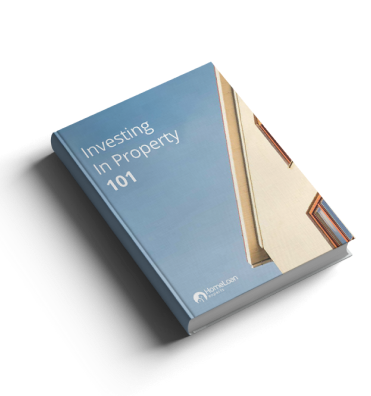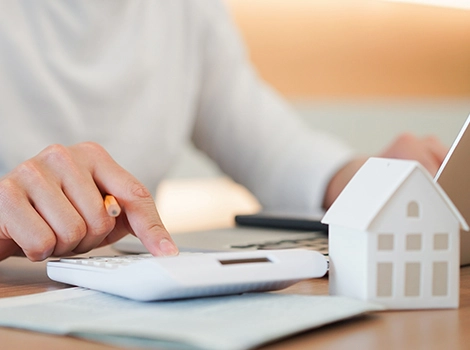Property investment has historically been a smart decision. But how do you decide if you’ve found the right one? There are tons of questions that you need to ask yourself. Will your property investment make money? What are the hassles involved?
And this is where the numbers come in. But even numbers can get overwhelming. A good real estate calculator helps you crunch the figures quickly, so you don’t have to sweat over spreadsheets.
Instead, you can focus on what really matters: choosing the right property and growing your investment. Let’s break it down into what really matters when picking the right real estate deal.
How To Use The Investment Property Calculator?
This 5-step calculator gives you a clear view of your investment property’s cashflow.
Step 1: Property Details
Enter the purchase price (e.g. $800,000) and estimated annual growth (3–8%). Choose your property type; House, Unit, or Townhouse, as this affects rental yield. You can also include depreciation to factor in potential tax savings.
Step 2: Loan Details
Input your deposit amount and interest rate (typically 6–7%). Choose whether you’re borrowing personally or through a trust. Select your repayment type: Interest Only for lower initial payments, or Principal and Interest to build equity.
Step 3: Income Details
Add your annual income to determine tax benefits. Estimate your weekly rent based on local listings. Set expected annual rent growth (usually 3–4%).
Step 4: Expenses
Review and adjust annual costs like:
- Council rates: $2,000–$4,000
- Insurance: ~$1,500
- Management fees: 6–8% of rent
- Maintenance: ~$1,200
- Water rates (if applicable)
- Adjust inflation (usually 3%) to match your outlook.
Step 5: Results
See monthly cashflow projections over 1, 5, 10, and 30 years. Includes rent growth, tax offsets from negative gearing, loan repayments, and property value increases.
Understanding Your Results
Positive cashflow means profit after expenses. Negative cashflow requires out-of-pocket contributions but offers tax benefits. Over time, rising rents and loan repayments often shift properties from negative to positive cashflow.
What Makes a Property Worth Investing In?
The primary goal with investment property is to create wealth.
And this can happen in two ways:
- Cash Flow: The rent you earn minus the costs of owning the property.
- Appreciation: The increase in your property’s value over time.
With an investment property, one of your goals is to find a property with positive cash flow, which means your property is putting money into your pocket, and not taking it out. This is a good sign, and it also makes it easier to hold onto a property for the long haul.
But here’s something most people forget; time’s more valuable. And properties that require constant repairs will eat into your time and make it feel like a full-time job. So, look for properties that are low-maintenance and manageable.
Apply For An Investment Loan
If you’ve used the calculator and would like to discuss your options, please call 1300 889 743 to speak with one of our mortgage experts.
Talk To An ExpertHow To Get Started With Property Investment?
One of the biggest misconceptions about property investment is you need to be a millionaire. Well, we did the math and you probably don’t need to be a millionaire but you do need a plan.
Save for your deposit
Look at your budget and start cutting back. Every dollar saved is a step closer to your first property.
Start small, but start
Set a clear goal and a realistic date. Write it down and commit to it.
Protect yourself
Do your research before signing anything. Get the right insurance and consider using a legal structure (like a trust or company) for better protection.
Watch your money
Keep an eye on income and expenses. Little leaks can sink a big ship.
Ask for help
Talk to experts. Learn from people already doing it. Books and blogs are great, but real-world advice is better.
How Is Capital Gains Tax Calculated On An Investment Property In Australia?
In Australia, capital gains tax (CGT) on an investment property is based on the profit from selling the property. The capital gain is the difference between the sale price and the property’s cost base, which includes the original purchase price, legal fees, stamp duty, and improvements.
If you hold the property for more than 12 months, you may qualify for a 50% CGT discount, reducing the taxable gain. The capital gain is added to your taxable income, and the actual CGT payable depends on your income tax rate.
Here’s a detailed breakdown of the calculation for Mark and Sarah’s capital gains on their co-owned rental property:
| Calculation Step | Details | Figures |
|---|---|---|
| A: Purchase Price | Initial property purchase | $750,000 |
| B: Costs of Purchase | Stamp duty and legal fees | $30,000 |
| C: Property Improvements | Fence construction | $6000 |
| D: Costs of Sale | Legal fees for sale | $10,000 |
| E: Capital Works Deductions | Claimed over ownership period | -$35,000 |
| F: Decline in Value Deductions | Depreciation claimed over ownership | -$5000 |
| Adjusted Cost Base (A + B + C + D - E - F) | Adjusted cost base calculation | $756,000 |
How Much Tax Is Paid On Rental Income?
In Australia, rental income is considered taxable income and must be declared in your annual income tax return.
The tax you pay on rental income depends on your overall taxable income and your marginal tax rate, as set by the Australian Taxation Office (ATO).
| Taxable Income | Tax Rate |
|---|---|
| $0 to $18,200 | Nil |
| $18,201 to $45,000 | 16 cents for each $1 over $18,200 |
| $45,001 to $135,000 | $4,288 plus 30 cents for each $1 over $45,000 |
| $135,001 to $190,000 | $31,288 plus 37 cents for each $1 over $135,000 |
| $190,001 and over | $51,638 plus 45 cents for each $1 over $190,000 |
Property Investment Guide 101
Learn the ins & outs of investing in properties from an experienced property investor and founder of Home Loan Experts, Otto Dargan.

You may qualify for an LMI discount, so complete our free online assessment form to find out more.
Frequently Asked Questions
How Much Deposit Do I Need For An Investment Property In Australia?
You need a 20% deposit in Australia for an investment property loan. A 20% deposit allows you to avoid Lenders Mortgage Insurance (LMI). But some lenders also accept a deposit as low as 5% if you have a stable income and a strong credit history.
In these cases, you could borrow up to 95% of the property’s value, provided you have at least 5% in genuine savings. Borrowing with a lower deposit, however, means you’ll likely need to pay LMI and cover additional upfront costs such as stamp duty, bank fees, and legal expenses.
What Is Cashflow In Investment Property?
Are Investment Loans Tax Deductible?
How Do You Calculate The Investment Value Of A Property In Australia?
Still need answers? We're here to help!
Ask an expertOur team of mortgage experts will assist you within 24 hours.





